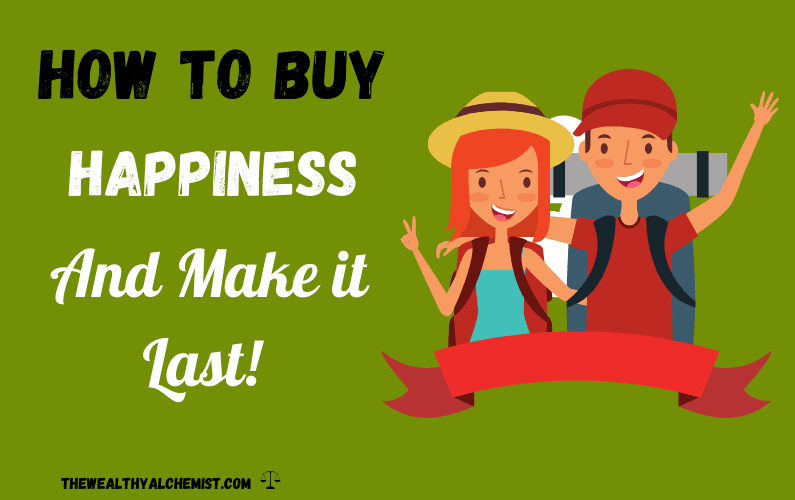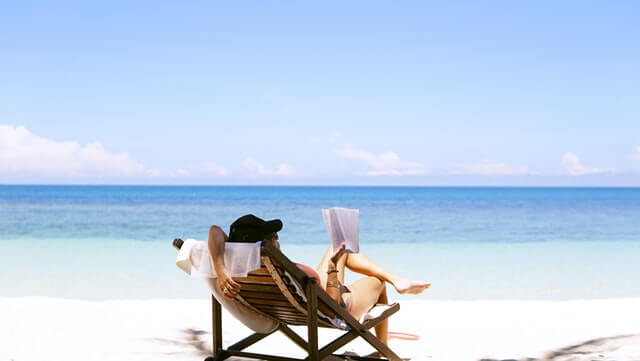
“Money can’t buy you happiness”, or so we’ve heard. But what would you say if I told you that money could buy happiness.
But wait! Before you bust out the old credit card let me explain what I mean.
Now, obviously, you’re not going to find the elixir of happiness for sale in your local Whole Foods next to the matcha tea. But what you will find is that there are some buying habits that, if adopted, will increase your feelings of happiness.
In this post, I’d like to cover a few buying habits that are sure to increase your level of happiness.
I first encountered this idea in the library where a book called “Happy Money”, by Elizabeth Dunn & Michael Norton caught my eye.
“Happy Money” introduced me to the idea that buying experiences could provide more happiness than buying things. And I quickly discovered a wealth of articles out there discussing this very topic.
The idea is pretty straight-forward:
There are two main categories of objects that each of us can purchase. We can either buy tangible, material things or, we can buy experiences.
Some things are necessary. We all have material necessities like shelter, clothing, and the like. But in this post, the things we’re talking about are the non-essentials that we buy mainly for enjoyment.
Experiences are necessary as well. We all need to experience things like love and social connections, but in this post, I’m focusing on experiences that are generally considered non-essential.
Related Post: Tips for Developing a Wealthy Mindset.

Buying Experiences Instead of Things
When we purchase something we usually experience a thrill at having acquired it. After all, who among us hasn’t felt that we would be happier, more respected or more loved once we owned that thing?
And while you may be happier for a short time after making the purchase, your life never permanently changes for the better, and the novelty quickly fades.
What’s worse is that you may actually feel unhappy after having made the purchase.
Imagine this:
- You just bought Super Phone 10 but two days later Super Phone 10x is released.
- Or maybe you get a new TV for $800 but later that week you realize that the same TV is on sale at a different store for $150 less.
- Lastly, imagine that you buy an expensive piece of jewelry in a moment of excitement but afterward you regret your impulsivity and are unable to get your money back.
These examples illustrate the problems with buying things. You expect a thing to make you happy but a better thing will always be available tomorrow. And it’s so easy to compare your phone with the newest model and see all the ways yours is deficient.
Why Experiences Make Us Happier
Now, in contrast to things, experiences are not as easy to compare with each other. A ski trip isn’t obviously better than a trip to a Florida
The subjectiveness of experiences makes it less likely that you will become disappointed with your decision when you buy experiences.
Another thing to keep in mind with experiences is that they are far more likely to foster social relationships. Not many of us would choose to experience the wonder of the Grand Canyon without company. Or go on a hike in the mountains all by our lonesome.
The fact that activities build and strengthen relationships makes it likely that we’ll find experiences more meaningful and enjoyable.
One last thing about experiences is that their enjoyability continues for years after the actual experience has ended. Who hasn’t had the pleasure of hearing their elders regale them with tales of past adventures?
More often than not the story is focused on something experienced with friends, not a thing that was bought Even if the experience was fraught with disaster, our memories tend to gloss over the bad and emphasize the good.

Pay Now, Enjoy Later
Nowadays it’s common for us to seek immediate gratification.
Not many people bother to save up for the things they want when they can instead buy it on credit. Essentially, we enjoy purchases before we actually have to pay for them.
This way of going about things can create a great deal of stress as you have to find the money to pay for the things you already have, plus interest.
But if you want to extract as much happiness as you can from a purchase you may want to consider doing the reverse. Paying for it first and then enjoying it later on.
This does two things:
1) It gets the pain of paying out of the way early on.
2) It allows you to build anticipation.
By getting the pain of paying out of the way well in advance, you’re giving yourself time to “recover” from making the purchase. This will give you the best chance to derive maximum pleasure from the item purchased.
Second, by building anticipation you are giving yourself time to imagine and build hype in your mind.
We’ve all experienced the thrill generated by a hyped up event. Often the hype is far more enjoyable than the event itself.
This is because the future is uncertain. And to deal with this we often let our imaginations go into overdrive creating possibilities and visualizing the perfect event. The same holds true for simple purchases.
The next time you buy a candy bar, wait a day or two before you eat it and see if you don’t actually enjoy it more.
Related Post: Emotional Spending Keeps You Broke.
Buy it Once in a Blue Moon
It’s said that “absence makes the heart grow fonder.” I never liked that phrase, but it’s true.
Here’s an example I’m sure you can identify with – leftovers…
Eating the same thing (even your favorite food) for two days in a row isn’t too bad, three’s pushing it, and four is probably out of the question for most of us.
That’s because too much of anything is too much. This is true for your purchases as well.
If you want to get the most happiness bang out of your buck, then you don’t want to get into the habit of buying things too often. Just do it once every blue moon.
Buy Your Time

According to a study by the Auto Insurance Center, the average American commuter spends 42 hours per year stuck in traffic.
That’s more than one whole work week. Yikes.
Now, what if you could take those 42 hours of frustration and do what you wanted with them? Like going on a week-long cruise or binging on your favorite TV series?
That would be awesome, wouldn’t it? Of course, it would! Because freeing up time for the things you want is one of the keys to happiness.
Now, I’m not saying that you can buy your way out of the daily rush hours, my point is just to show that spending time on things you don’t like is a drain on your quality of life.
Go ahead and pay for that toll road if it’ll save you a few minutes of frustration.
If you hate, hate, hate cleaning then it may be worth your while to hire a maid to stop by your place once a week. Or buy a Roomba.
Maybe you spend too much time preparing food or doing laundry. Investing in time-saving cooking and cleaning equipment may cost a pretty penny (or two), but your happiness and quality of life are likely to improve.
The point is…don’t just spend money to get the things you want, spend money to avoid the things you don’t want if you really want to boost your happiness.
Related Post: Inspirational Money Quotes.
How to Buy Happiness. The Bottom Line.
While you’re not going to find happiness in a bottle, the purpose of this post was to show that there are several ways that your purchases can affect your happiness.
The main thread connecting all of these ideas is that happiness is more often a product of psychological factors.
Experiences are about developing your relationships with others, broadening your horizons and creating memories to cherish.
Building anticipation allows you to savor the promise of future possibilities even for small purchases.
Buying your favorite things rarely instead of frequently will keep the novelty and freshness alive.
And buying time will lower your frustration by allowing you to feel that your time is really yours to enjoy.
Implement one or all of these techniques and give your happiness a boost.
If you’re already doing these let us know how it’s going or if you have other ideas about how your spending habits can increase your happiness let us know in the comments below!
Cheers!

Oliver
Latest posts by Oliver (see all)
- 26 Best Personal Finance Tips To Rock Your Money! - November 18, 2020
- How Much is 6 Figures? Epic Salaries Explained. - September 10, 2020
- Is Ibotta Legit? The Most Complete Ibotta Review 2021 - April 15, 2020

